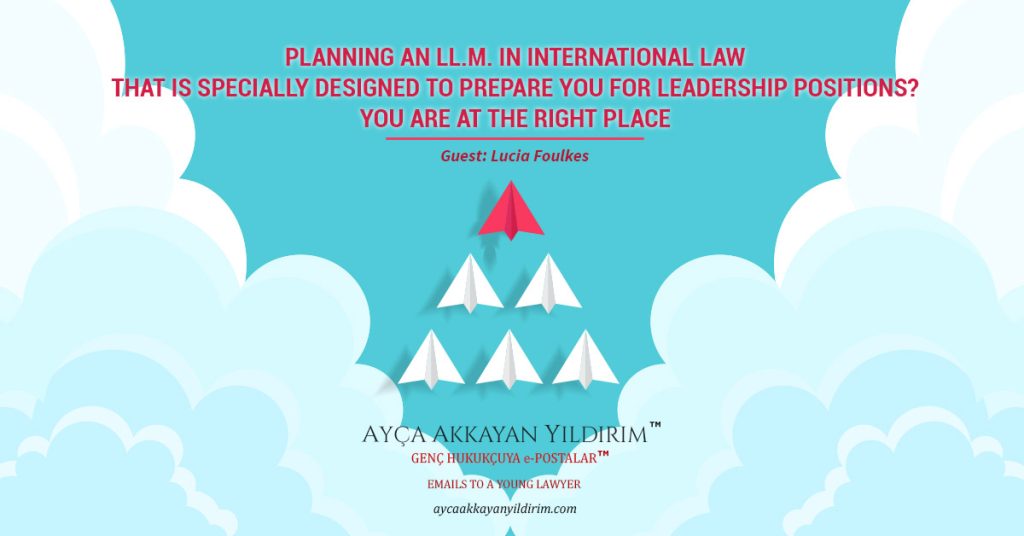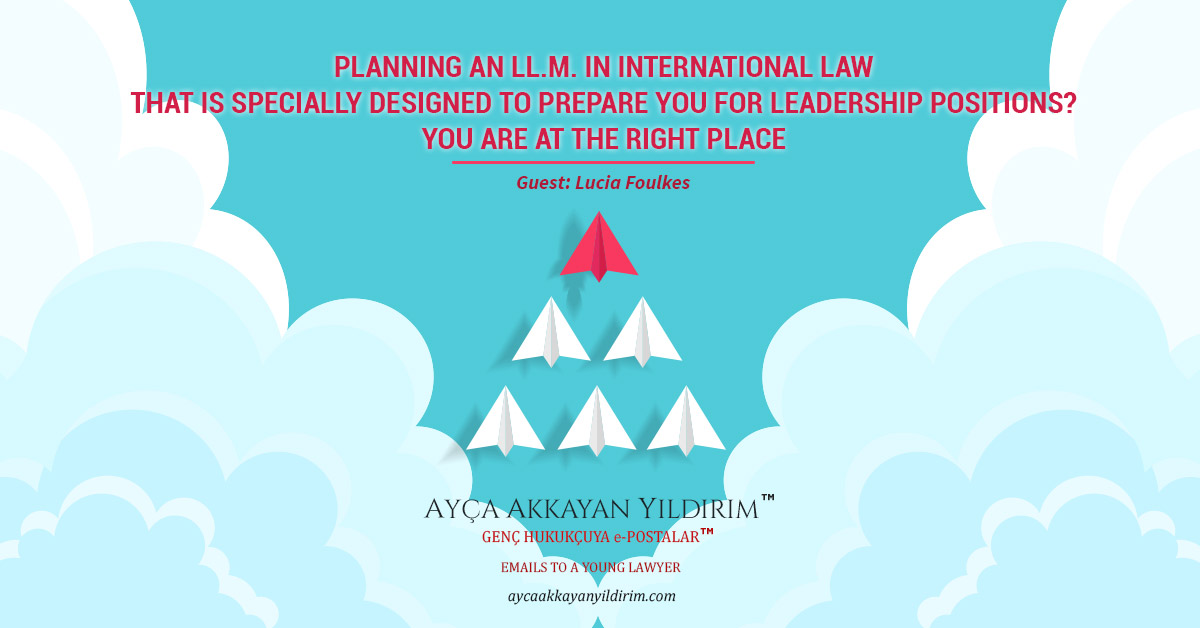Tuesday, June 15, 2021


Date : June 15, 2021
To : Young Lawyers
Re : PLANNING AN LL.M. IN INTERNATIONAL LAW THAT IS SPECIALLY DESIGNED TO PREPARE YOU FOR LEADERSHIP POSITIONS? YOU ARE AT THE RIGHT PLACE
INTERNATIONAL LL.M. PROGRAMS: TUFTS UNIVERSITY THE FLETCHER SCHOOL, MEDFORD, MA, USA
Lucia Foulkes, Associate Director of the LL.M. in International Law, thank you for taking the time for this interview. GHK
GHK: Associate Director Foulkes, in recent years, it has become a trend in Turkey, and in fact, in the world that law graduates pursue an international LLM degree, if possible. I realize that people often forget to ask themselves why one should pursue an international LLM degree, given that this a serious investment in terms of time and cost. What do you think is the value of an international LL.M.?
LF: Earning your LL.M. gives you the chance to spend a year specializing in an area of law that is of particular interest. Earning your LL.M. overseas means you’ll have the added benefit of studying the law from a whole new perspective and making connections with other lawyers from around the world. In today’s interconnected world, being able to understand and work with colleagues from different countries is a comparative advantage for young lawyers.
GHK: I understand Fletcher’s LL.M. in International Law differs from traditional law schools as the program focuses exclusively on public and private international law issues. Could you please elaborate on how studying Fletcher’s LL.M. in International Law differs from LL.M. programs in International Law offered by traditional law schools?
LF: The Fletcher School of Law and Diplomacy at Tufts University is an interdisciplinary school of international affairs with a long history of teaching and research in the areas of international law. We differ from traditional law schools in that, in addition to international law, subjects such as international relations, security studies, business, human rights, and more are integral to our curriculum. Lawyers working in an international environment are not operating in a silo—they need to be able to work with colleagues coming from different academic backgrounds and understand the social, political, and economic context in which the law operates. Fletcher students study international law but also have access to the rest of our curriculum. For example, a student studying international human rights law can take a course in gender studies or migration. A student studying international trade law can take a development economics course.
GHK: Could you please tell us about some of the shared characteristics of successful LLM applicants? Is there anything in particular that might make an applicant especially appealing to the admissions committee?
LF: A successful applicant has done well in his or her university coursework, has some experience outside of the classroom, and can explain why Fletcher is a good fit for his or her career preparation. Since we’re focused on international law, it is helpful to hear about an applicant’s specific interests and career goals within that field so we can understand whether we’ll be a good fit for what the student is looking for.
GHK: To be admitted, would it be better to apply right after graduation, or does the Fletcher School of Law prefer candidates with a few years of work experience?
LF: We accept students in both situations. Work experience definitely adds to an application, but we see very strong students coming straight through from their first law degree (LLB or JD) as well. For less-experienced students, we place more emphasis on grades, the quality of their essays, and take a close look to see how clearly they’ve thought through a career path. We also value internships, volunteer experience, working in a clinic during law school, and moot court and journal experience.
GHK: I ask this to many deans and directors I interview— What advice would you give to the prospective applicants from Turkey regarding writing the personal statement? Any suggestions on the mistakes that prospective applicants should avoid?
LF: The mistake I see most often is rehashing what is on your resume. The personal statement should not list everything a student has done or studied. The personal statement is a student’s opportunity to explain why. Why are you interested in Fletcher in particular? Why do you want to focus on international law, and how do you imagine your career progressing? Answer those questions and use your previous experiences to explain why we are the best fit for you.
GHK: One of the obstacles that applicants often face is choosing referees. Could you tell us what advice you would give to applicants from Turkey in this regard?
LF: I actually contributed a blog post on this topic to our Fletcher Admissions blog. I would encourage students to take a look at the blog post titled “Application tips from Lucia” published on the Fletcher School’s website.
If you are coming from a large school where you didn’t develop close relationships with faculty, or you’ve been out of school for a few years, there are tips that help students get good letters of recommendation. When approaching a faculty member, the student should pass along their resume and include a list of recent accomplishments and work history that the faculty member might want to mention. The student should also share their motivation for attending graduate school and what they hope to accomplish. Finally, remind the faculty member of the grade you got in their class and any relevant papers or accomplishments he or she might want to mention. Putting all of this information in one email will make it much easier for a faculty member to remember key highlights for that particular student and write a strong letter.
In addition, it is perfectly acceptable for a student to have one of their references come from a former work or internship supervisor. As long as the recommender can speak to the student’s intelligence, skills as a lawyer, and general motivation, we are happy to see references from work supervisors.
GHK: Considering the relatively short nature of the LLM degree itself, what should the LLM candidates do to make the most of their LLM experience?
LF: Academically, make an effort to get involved with centers and programs on campus that align with your areas of interest. Fletcher has a wide variety of centers, such as our Center to International Law and Governance, our Center for International Environment and Resource Policy, the Maritime Studies program, and many more. These centers offer students research opportunities, the chance to participate in study trips, as well as events and conferences. Getting involved with one will give you the chance to build meaningful relationships with students and faculty who share your interests, as well as deepen your engagement with an academic area of interest.
Outside of the classroom, there is a lot to do socially. Fletcher is usually about 40% international students, with people joining us from all over the world. Take the time to get involved in student clubs, go on the annual ski trip, or to the culture nights and other events that student groups put on. You’ll not only make friends for life but also form a professional network that will support you throughout your career.
GHK: What are the job opportunities available in the States or abroad to someone who has earned an LL.M. at the Fletcher School? With respect to Fletcher’s LL.M. in International Law, could you share some details on the job opportunities that graduates have gotten in the past?
LF: The Fletcher LL.M. focuses exclusively on international law, so our students go into international law careers as opposed to domestic U.S. law. (We do not prepare students to sit for the bar exam in the United States). Graduating students pursue careers in international law in a variety of places, but the most common ones would be 1) International Organizations, such as the United Nations or European Union, 2) Governmental jobs with their home country government, such as with a Ministry of Foreign Affairs or Ministry of Defense, 3) with an international law firm, often working international issues such as trade or investor-state arbitration.
GHK: Some Turkish law graduates and lawyers are interested in research-based careers. What advice would you have for those looking at Fletcher’s LL.M. as a path to a doctorate degree?
LF: My advice for students thinking seriously about a doctoral degree is to start publishing as soon as possible. Whether it be contributions to a law review, a news organization, or a trade publication, research and publishing is key to a successful academic career.
All LL.M. students at Fletcher write an academic thesis (we call it a “Capstone”) as part of their degree program. This is a great way to engage in original scholarship, and a number of students choose to submit their papers for publication in U.S. law reviews. We have had students go on to doctoral programs at places like Harvard, Cambridge, and Sciences Po. For students who would like to stay on at Fletcher, we offer a Ph.D. program in International Relations, with international law available as a secondary field. Students interested in that path can stay on at Fletcher for a second year and earn a dual masters/ LL.M., which will qualify them to apply to our internal Ph.D. program.
GHK: Thank you for speaking with us, Associate Director Foulkes. Lastly, what advice would you have for Turkish law graduates looking to pursue an LL.M. abroad?
LF: Think about your goals for your program ahead of time. Would you like to return to Turkey or practice elsewhere? If practicing outside of Turkey, is your goal to emigrate and practice another country’s domestic law, or would you like to work at an international organization or private company? If you are looking to stay overseas and practice another country’s domestic law, take a look at what you would need to do to pass the bar exam and how successful international students are at passing and then finding employment in the country. When choosing a school, attend their information sessions, and request a one-on-one chat with an admissions representative for the schools you are most interested in. You should also ask if they can connect you with alumni from Turkey so you can get a student’s perspective on the program.
Finally, consider connecting with Turkey’s Education USA office. They offer free, unbiased information on studying in the United States and occasionally host an LL.M. fair with representatives from U.S. universities. If you are looking for some basic guidance, Education USA is a great place to start.
